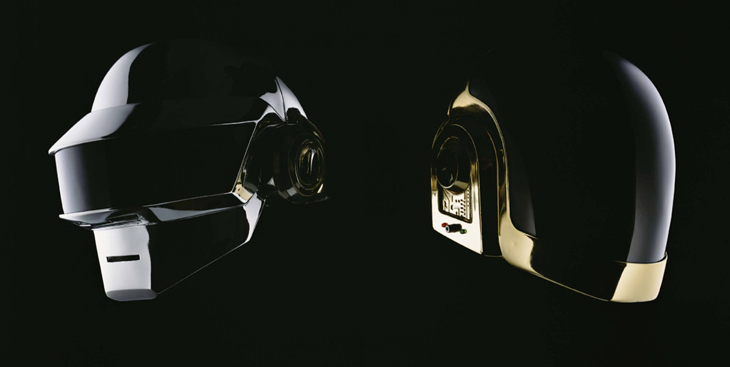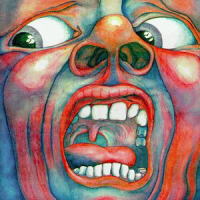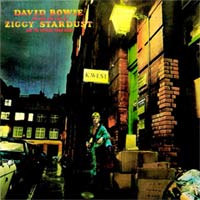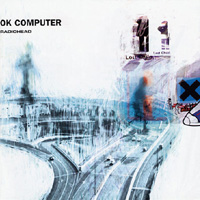10 Essential Sci-Fi Albums

Any good nerd — music or otherwise — will recognize that there’s a combination of exciting science fiction-related events upon us. First, later this month, Daft Punk will release their long awaited new album, Random Access Memories, thus proving to us all that the robots are taking over. And second, this Saturday (as has since been dubbed by some clever and vocal social networking types) is Star Wars Day (“May the 4th be with you” — we’re not going to stop you from groaning at the pun). So, this presented a fun opportunity: Sci Fi albums!
Science fiction has permeated popular culture and popular music in particular, for a long time, and began to reach a fever pitch in the 1950s when space culture began to find its way into exotica, lounge and surf rock. And since then, the skies (and beyond) have been the limit. So, we submit to you our favorite sci-fi themed albums. Use the force. Live long and prosper. (Eh, let’s just frakkin’ get on with it, gorram it!)
 King Crimson – In the Court of the Crimson King
King Crimson – In the Court of the Crimson King
(1969; Atlantic)
If King Crimson’s debut album, In the Court of the Crimson King, is a work of science fiction, the dystopia that it depicts sometimes comes pretty close to earth as it was in 1969. And for that matter, a lot of it hasn’t changed. As the group stirs up a frenetic whir of virtuosic guitar riffs and ominous saxophone in opening track “21st Century Schizoid Man,” Greg Lake offers a vision of greed and consumerism gone amok (“Death seed/blind man’s greed/Poets’ starving children bleed/Nothing he’s got he really needs“), not to mention his intense reading of the song’s title/antihero. That dark vision grows even more bleak and funereal with “Epitaph,” and on the album’s majestic closing anthem, “The Court of the Crimson King,” Lake juxtaposes medieval motifs with visions of a “prism ship” and “prison moons,” expanding a continued dystopic theme with rich imagery and complex allusions. In the Court of the Crimson King is best viewed, then, not as Star Wars science fiction, but rather a more literary and abstract take. But hey, that’s prog rock for you. – JT
 David Bowie – The Rise and Fall of Ziggy Stardust and the Spiders from Mars
David Bowie – The Rise and Fall of Ziggy Stardust and the Spiders from Mars
(1972; RCA)
When David Bowie sets out to do something — and really, really means it — he can almost never be bested. So, while several of the albums on this list are formed around a loose science fiction story, or simply serve as a companion-piece to a work of sci-fi, Ziggy Stardust is a full-out concept album, with the story clearly written throughout the lyrics. Almost a rock-opera of sorts, the album gives us a view of an Earth with only five years’ time remaining. And just when things seem as bleak as they come, a god-like alien comes in the human form of Ziggy Stardust, a powerfully talented and reckless rock star, descending on the world to preach a gospel of hope, love and guitar solos. And what makes Ziggy such an excellent sci-fi album is that, musically, it’s simply a stellar glam-rock album, containing no outwardly ‘space-like’ or alien sounds. However, through his tone and storytelling, Bowie doesn’t let the album’s themes escape the listener for even a second. Apart from being one of most classic albums of the era, The Rise and Fall of Ziggy Stardust and the Spider of Mars is a space-epic fit to reign upon some of the best flicks and books in the genre. – ATB
 Rush – 2112
Rush – 2112
(1976; Mercury)
Neal Peart’s fandom of Ayn Rand is no secret, and he made it obvious with side one of their breakthrough LP, 2112. He takes her 1936 novella, Anthem, about a futuristic society in which all individual thought is abolished, and adapts it with a rock-n-roll twist. Instead of a light bulb, our hero finds a guitar. The music he plays, it turns out, was what Rush needed to separate from the pack of similar ’70s artists, fulfilling the prophecy implied in the long title track. Rush found the perfect combination of prog-rock, hard-rock, and pop that would launch them into orbit. Despite that it’s one 20-minute song (in five parts), “2112” remains one of the band’s most popular numbers. The rest of the album, not to be outdone, contains band staples like “A Passage to Bangkok” and “Something For Nothing.” The important aspect of 2112 is the band didn’t sell out — they were still Rush — but they did fine-tune their songwriting skills just in time for the rest of the world to catch up to the future they were trying to create. – CG
 Kraftwerk – The Man-Machine
Kraftwerk – The Man-Machine
(1978; EMI)
Essentially every Kraftwerk album is a concept album, be it Trans-Europe Express‘ railroad soundscapes, or Autobahn‘s epic paean to the German highway system. The Man-Machine, however, is the album that made Kraftwerk cybernetic heroes. Long before Daft Punk adopted a robotic persona, these synth-pop pioneers took on droid form of their own, plugging into vocoders to deliver a cyber serenade on “The Robots.” Meanwhile, “Spacelab” and the title track further explore the relationship between man and machine (you know, like in the title), while “Neon Lights” and “Metropolis” take the concept outward into an urban landscape. Only “The Model,” a pop song that takes a critical look at a figure’s glamorous, privileged lifestyle, doesn’t quite fit into the theme, but the song is essentially perfect anyway, so it fits in just fine. There’s no plotline to speak of here, just a sublime musical glimpse into a robotic future utopia. – JT
 Tubeway Army – Replicas
Tubeway Army – Replicas
(1979; Beggars Banquet)
When synth-pop hit its stride during the new wave era of the late ’70s and early ’80s, science fiction elements became something of a staple, presented in any number of ways, be it as kitsch (The B-52s), art-house (John Foxx) or dadaism (Devo). Gary Numan, in particular, embraced science fiction in its literary forms, taking much of the inspiration for his albums Replicas (as Tubeway Army) and The Pleasure Principle from the novels of Philip K. Dick. The former, in particular, feels a lot like an abstract re-telling of Do Androids Dream of Electric Sheep?, with big, thick analog synth sounds providing a backdrop for a Replicant civilization. Chief among the standouts here are “Are ‘Friends’ Electric,” which woefully never became a hit in the United States like it did in the UK, and “Down In the Park,” a chilly robot ballad in which Numan intones, “We are not romantics… we are here to serve you.” Think of this one as an even more sinister take on The Man-Machine. – JT
 Radiohead – OK Computer
Radiohead – OK Computer
(1997; Capitol)
It could be said that the best science fiction is actually written as a comment on the present. This is certainly the direction that brilliant sci-fi authors like Philip K. Dick and Ray Bradbury took. Sure, Thom Yorke has identified his lyrics on OK Computer as directly inspired by the world around him. And yes, the band has repeatedly denied any indication that the record (or any of their records) is a concept album. But, regardless of the artist’s intent, it’s next to impossible to listen to OK Computer without envisioning a post-apocalyptic future of some sort. Between the brilliant, unearthly sounds, Thom’s disconnected yet intense lyricism, and the sudden mood changes found within, the record disconnects the listener from the modern world, even 15 years after its release. And, if that weren’t enough, the pairing of “Karma Police” and “Fitter Happier” make for the most strange and enchanting seven minutes of police-state mentality that you’ll ever hear. So, regardless of what you hear when you spin one of Radiohead’s most applauded album, one thing’s for certain: it definitely does not seem of this world. – ATB
 Deltron 3030 – Deltron 3030
Deltron 3030 – Deltron 3030
(2000; 75 Ark)
When an album opens with the framing line “It’s the year 3030,” you should probably have a decent inkling that some futuristic antics are in store. On Deltron 3030, though, not even an opener like that can adequately prepare you; by the time an ethereal chorus springs from the track and a hip-hop beat kicks in, it is clear that what you’re listening to is something new entirely. Sure enough, Deltron 3030 (Del and Dan the Automator) build on the tradition of some of the other albums on this list (2112 comes to mind, specifically) to create a * deep breath * dystopian prog-rap concept album. Equal parts Blade Runner, The Matrix, and Star Wars, the narrative recounts the story of a sentient android that wages rebellion against an oppressive, Big Brother-eqsue government. In addition to being a brilliant exercise in stylistic innovation, Deltron 3030 holds its weight as a rap album, too, with the best production in Dan the Automator’s career and some of Del’s finest rapping working in tandem to produce a modern classic. So next time you’re feeling some rap and a sci-fi movie, save yourself some time and spin this instead. – CB
 Daft Punk – Discovery
Daft Punk – Discovery
(2001; Virgin)
It wouldn’t be a list of sci-fi albums if the masters of robot rock didn’t make the list. It’s true that everything that the French house duo touches tends to land somewhere in between dance-pop and a sound much more suited for a space-age club or – at the very least – a new age art exhibition. However, long before Daft Punk provided the score for the revitalized “Tron” franchise, the group’s 2nd release served a double purpose as a sound track to Interstella 5555: The 5tory of the 5ecret 5tar 5ystem, an anime flick detailing the kidnapping and rescue of a rock band comprising blue humanoid extra-terrestrials. However, Daft Punk sweetens the deal with a record that truly sounds like an outer-space version of an ’80s rock band. Sure, there are the dance hits everyone recognizes (“One More Time” and “Harder Better Stronger Faster”) to name a few. But some of the true gems on this album (“Crecendolls,” “Superheroes,” “Too Long”) take the group’s space-age house and elevate it to a level that might feel more at home in a stadium than a dance floor. – ATB
 The Flaming Lips – Yoshimi Battles the Pink Robots
The Flaming Lips – Yoshimi Battles the Pink Robots
(2002; Warner Bros.)
What makes Yoshimi Battles the Pink Robots a great Sci-Fi rock album is not just the fact that it’s a concept piece about a young martial arts expert whose job it is to protect the city against those “evil machines”; it’s also what’s found in the music itself. The Flaming Lips follow their 1999 groundbreaking The Soft Bulletin with the next logical step: combining their fine mix of experimentation and songcraft with storytelling. The opening track, “Flight Test” features beats that, in 2002, were ahead of their time, delay-laden vocals, and keyboard-driven flatulence that sounds playful but never frivolous. The title tracks (plural) encapsulate the sci-fi gestalt: Part 1 paints the futuristic picture lyrically, and the instrumental Part 2 melds sounds that are other-worldly. Intermixed are some of the Lips’ most beautiful pieces, such as “Do You Realize??” and “All We Have is Now,” but they maintain the spacey feel of the rest of Yoshimi. Yoshimi might be the Lips’ Dark Side of the Moon in scale, innovation and impact. It’s a great sci-fi album because it helped create the future. – CG
 Janelle Monae – The ArchAndroid
Janelle Monae – The ArchAndroid
(2010; BadBoy)
From her fashion sense to her vocal prowess to her live performances, Janelle Monae does not aim for simplicity. Even her genre-bending mash-up of hip-hop, rock ’n’ roll, soul and indie-pop urge the listener to expect a lofty, high-art set of lyrics to accompany the sound. Consequently, it’s no surprise that Monae’s debut full-length (following the story set up by her debut EP) chronicles the story of an android who feels alienated from the rest of society. Through this single story arch, Monae covers topics ranging from identity to fear to race and class issues to self-appreciation and accomplishment. And while only a few of the songs sound overly futuristic, they all seem pretty out of this world, especially when compared to hitmaker R&B. The ArchAndroid is that bizarre sort of album that aims for a pretty lofty goal – and pulls it off with what seems like an effortless shrug. – ATB

